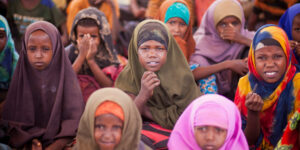Food Security and Nutrition: Do Women in Leadership Positions Make a Difference?
Women and girls in all regions of the world are disproportionately affected by the ongoing unprecedented global food security crisis triggered by the COVID-19 pandemic, escalating conflicts and climate extremes. This is a dire consequence of existing gender inequalities and social and economic discrimination, which result in a higher prevalence of hunger, malnutrition, and food insecurity among women and girls.
Women’s ability to play their essential roles in food systems — from production to processing, marketing, distribution and consumption — is also severely hampered to the detriment of the food security and nutrition of their households and communities.
Achieving gender equality and closing the gaps between women and men in accessing adequate food, health services, education and training, labour market and decent jobs, finance and other services, and natural and productive resources is critical to addressing food security and nutrition, which is now a top priority on the international agenda.
The presence of women in leadership positions is frequently advocated as part of public policy to address gender inequality. But are women in the driving seats making different decisions than men? Do they set up a different policy agenda that accelerates gender equality, with positive results for food security and nutrition?
Higher participation of women in decision-making and leadership is generally supported by case studies and anecdotal evidence. A recent book by Paola Profeta, “Gender Equality and Public Policy: Measuring Progress in Europe,” provides compelling evidence across countries that women leaders do shape public policy. While the book focuses primarily on developed countries, it also provides evidence in developing countries.
The author first analyses whether gender influences views of politicians on general topics (economy, rights, environment, women’s issues, migration, etc.), based on a large survey of candidates running for parliamentary seats in more than twenty countries in different elections between 2005 and 2016. The author finds that women and men have different policy agendas, independent of their political orientation. Women are more open to social issues, including migration, rights and the protection of the environment, and are less inclined towards military intervention and expenditures.
The author then investigates whether the share of women in parliaments was correlated with different categories of public expenditure, using aggregated country-level datasets. She finds that a higher proportion of women in parliament was associated with higher allocations to some categories of public expenditures that are more oriented toward women’s needs.
